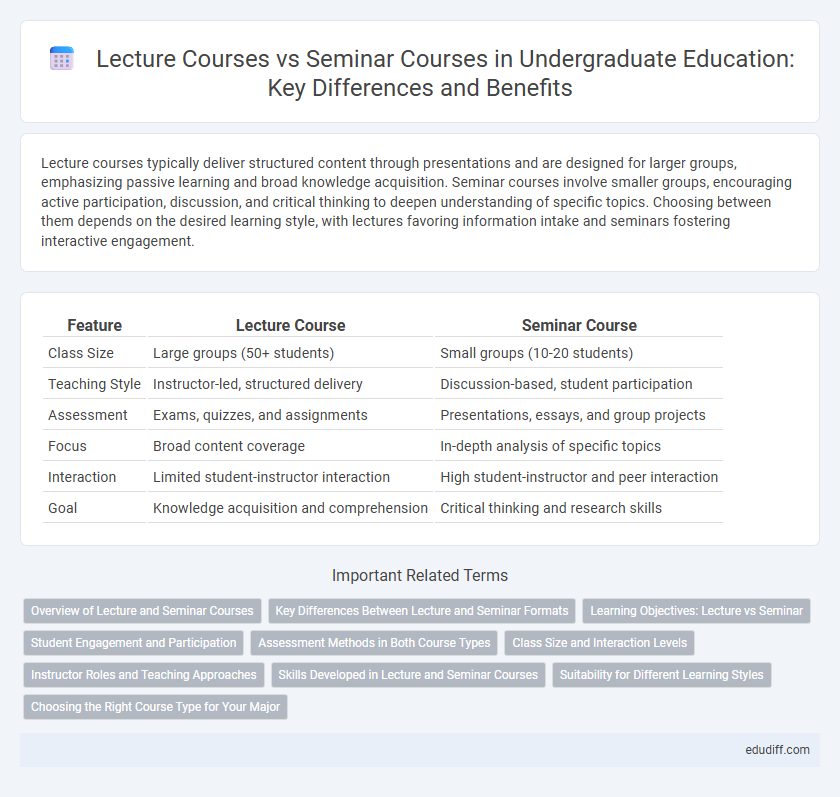Lecture courses typically deliver structured content through presentations and are designed for larger groups, emphasizing passive learning and broad knowledge acquisition. Seminar courses involve smaller groups, encouraging active participation, discussion, and critical thinking to deepen understanding of specific topics. Choosing between them depends on the desired learning style, with lectures favoring information intake and seminars fostering interactive engagement.
Table of Comparison
| Feature | Lecture Course | Seminar Course |
|---|---|---|
| Class Size | Large groups (50+ students) | Small groups (10-20 students) |
| Teaching Style | Instructor-led, structured delivery | Discussion-based, student participation |
| Assessment | Exams, quizzes, and assignments | Presentations, essays, and group projects |
| Focus | Broad content coverage | In-depth analysis of specific topics |
| Interaction | Limited student-instructor interaction | High student-instructor and peer interaction |
| Goal | Knowledge acquisition and comprehension | Critical thinking and research skills |
Overview of Lecture and Seminar Courses
Lecture courses in undergraduate programs emphasize structured content delivery through instructor-led presentations, covering broad theoretical frameworks and foundational knowledge. Seminar courses focus on interactive, discussion-based learning, encouraging critical thinking, student participation, and in-depth exploration of specialized topics. Both formats complement each other to enhance comprehensive understanding and active academic engagement.
Key Differences Between Lecture and Seminar Formats
Lecture courses primarily involve one-way communication where the instructor delivers content to a large group of students, emphasizing foundational knowledge and broad topic coverage. Seminar courses foster interactive discussions among smaller groups, encouraging critical thinking, active participation, and in-depth exploration of specialized subjects. The lecture format relies on structured presentations and assessments, whereas seminars prioritize dialogue, peer collaboration, and qualitative analysis.
Learning Objectives: Lecture vs Seminar
Lecture courses primarily aim to deliver foundational knowledge and theoretical frameworks through structured presentations, enabling students to grasp core concepts efficiently. Seminar courses focus on developing critical thinking, analytical skills, and active participation by encouraging in-depth discussions, case studies, and collaborative projects. Both formats complement each other by combining knowledge acquisition in lectures with interactive learning experiences in seminars.
Student Engagement and Participation
Lecture courses typically involve passive learning where students primarily listen and take notes, resulting in lower direct student engagement. Seminar courses encourage active participation through discussions, presentations, and collaborative projects, fostering deeper critical thinking and communication skills. Enhanced student involvement in seminars leads to increased retention of material and more personalized learning experiences.
Assessment Methods in Both Course Types
Lecture courses primarily use exams, quizzes, and written assignments to assess student understanding, emphasizing content retention and comprehension. Seminar courses rely heavily on oral presentations, class participation, and research papers, promoting critical thinking and active engagement with material. Assessment methods in seminars encourage collaborative learning and deeper analysis, contrasting the more structured evaluation common in lectures.
Class Size and Interaction Levels
Lecture courses typically feature larger class sizes, often exceeding 100 students, which limits personalized interaction and fosters a more passive learning environment. Seminar courses usually have smaller groups, generally between 10 to 20 students, enabling active participation, in-depth discussions, and closer student-faculty engagement. This distinction significantly influences the learning experience and student engagement in undergraduate education.
Instructor Roles and Teaching Approaches
Lecture courses primarily demand that instructors deliver structured content through presentations and guided explanations, focusing on knowledge transmission to a large group of students. Seminar courses require instructors to adopt facilitative roles, encouraging active discussion, critical thinking, and collaborative learning among smaller student groups. Teaching approaches in lectures emphasize clarity, pacing, and comprehensive coverage, while seminars prioritize interactive dialogue, personalized feedback, and deeper exploration of specialized topics.
Skills Developed in Lecture and Seminar Courses
Lecture courses in undergraduate programs primarily develop strong analytical and note-taking skills through structured content delivery and comprehensive explanations. Seminar courses emphasize critical thinking, oral communication, and collaborative discussion skills by engaging students in interactive debates and presentations. Both formats enhance academic research abilities, with lectures fostering foundational knowledge assimilation and seminars promoting deeper interpretative insights.
Suitability for Different Learning Styles
Lecture courses suit students who prefer structured learning with clear, instructor-led content delivery, benefiting those who absorb information effectively through listening and note-taking. Seminar courses are ideal for learners who thrive on active participation, discussion, and collaborative exploration, catering to individuals who engage deeply by debating and exchanging ideas. Both formats complement diverse learning preferences, with lectures emphasizing comprehension and retention, while seminars foster critical thinking and communication skills.
Choosing the Right Course Type for Your Major
Selecting between a lecture course and a seminar course depends on your major's requirements and learning style preferences. Lecture courses typically provide broad coverage of foundational knowledge through structured presentations, making them ideal for majors needing comprehensive understanding. Seminar courses emphasize discussion and critical analysis, offering a collaborative environment suited for majors focused on research, debate, and in-depth exploration.
Lecture Course vs Seminar Course Infographic

 edudiff.com
edudiff.com